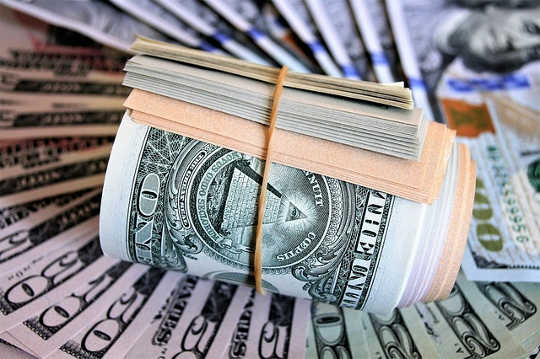
Image by pasja1000
When I was a child, there once stood a wall so high, thick and militarily defended that most of us couldn’t imagine it would ever come down. It wound through the center of Berlin like a concrete snake, constricting the hearts and minds of those who were caught within its coils. Life for those who resided near the wall was a study in contrasts. Outside the wall spelled freedom—the freedom to be, do and experience life the way one wished to live it. Being trapped behind the wall meant enslavement: enslavement to a system that imposed its beliefs on people at the point of a gun.
Which side people found themselves on was mainly an accident of birth—which made the wall seem that much more capricious. As unfair and absurd as it was, however, our knowing that which side of the wall you lived on was a function of fate and not free choice didn’t make it less solid.
During the wall’s lifetime, as many as eleven hundred people were killed while trying to escape from East Berlin, yet the people who lived behind the wall never stopped trying to make their way to freedom. Then on November 9, 1989, after the West Berlin television station ARD* inaccurately broadcast that East Germany would no longer defend the gates against unauthorized crossings, an immense crowd of East Berliners surged to the base of the wall and demanded their freedom. [*Mary Elise Sarotte, “How It Went Down: The Little Accident That Toppled History,” The Washington Post, November 1, 2009.]
The wall’s guards had in fact not been instructed to let them pass unmolested, but once they witnessed that sea of humanity clamoring for freedom, they put down their guns without firing a shot. Strangely enough, the wall we’d all thought was so solid, so impenetrable, gave way that day with an ease that would have been unimaginable only the day before.
The amazing thing was it didn’t fall victim to a violent civil uprising, but to a peaceful collective embrace of a new belief: the belief that the wall could no longer imprison its people. If history teaches us anything then, it’s that when people hold to their truth and come together around an idea they know to be right, together they become so mighty a force that nothing can suppress their indomitable will.
Money Is A Psychological Wall
Humanity’s present driving need for money isn’t much different from the drive of the East Berliners to get past that wall. Money is nothing more than a psychological wall we’ve constructed to separate ourselves (and each other) from the global abundance that already exists on this planet.
Everything we need to thrive as a species—food, land, shelter, water, educational opportunities, energy, clothing, furnishings, travel, health care, beauty, artistic experiences—exists in quantity outside the money wall. What we’ve been trained to do to access those things is work continuously for money, which we give away in exchange for what we need to survive inside the money wall. The ultimate goal of the game, however, is to escape, to make our way outside the wall by accumulating so much money that we’ll never need to work for it again.
The money game was already in full swing for centuries before any of us were born. We certainly didn’t invent it and, at this point, like all the Berliners born after their concrete wall was completed in 1961, we can hardly imagine what life would be like without it.
The problem is, we can’t afford to stop playing the game long enough to figure out whether it’s still the game we humans want to play. We’re all so busy surviving we don’t have much time to wonder what the world might look like tomorrow if we deconstructed the wall and decided to share everything that already exists outside it.
Much like those early intrepid East Berliners, we’ve instead turned our focus on finding new and creative ways to get ourselves over the wall and away from the forced labor camp that is our modern economy. Some of us steal from others to achieve success.
Most of us, though, play the game by the rules: sacrificing our free time and the time we spend with our families, or surrendering our dreams, talents and passions in exchange for a shot at long-term financial security.
“Every Man For Himself”
At this stage of the money game we’re operating under an “every man for himself” style of play. We’re exhorted from childhood to pull ourselves up by our bootstraps, to compete ferociously against our peers and to win at any cost, to be strong and proud and to strive against all odds. Those characteristics, we’re told, are the mark of a noble character.
We’re taught that the end justifies the means, that it’s a dog-eat-dog reality, that might makes right and it’s a winner-take-all kind of world. We’re taught that winners never quit and quitters never win, and that only the strongest and fittest among us survive. We operate under the theory of buyer beware, not seller behave.
Anyone who fails at the game—who whines or complains or tries to attack the wall—is labeled a loser, deserving of punishment, blame and public humiliation. The animal rights movement, the civil rights movement, the feminist movement and the environmental movement, to name but a few, all have had their martyrs: leaders who were murdered, imprisoned or marginalized for speaking out and standing up for higher ideals they believed to be right.
These people were punished for putting a chink in the wall—a window from which we could all view what life could be like on the other side. By daring to speak of providing real opportunities for all people, by insisting that everyone alive holds a birthright to whatever this planet has to offer, and by condemning the inherent inequities, abuses and exploitive practices of the economic system they opened people’s minds and hearts to alternative possibilities.
A Win/Lose Game
This wall we’re all trying to scale—this economic game we’re all playing—is a win/lose game. It’s one where we each try our best to hoard as much money as we possibly can while paying for our survival needs as we go, so we can eventually heave ourselves over the money wall and into abundance. Meanwhile, other people try their best to separate us from our money, so they too can hoard more and eventually get themselves over the wall.
Once in a while an intrepid individual—Bill Gates for example, or Oprah Winfrey—does manage to accumulate so much money that he or she successfully makes it safely over the wall. Suddenly that person finds they have access to unlimited worldly delights, as measured by all the best things money can buy. It’s rather like becoming the biggest hotel-holding landowner in the game of Monopoly®. The moment a single player controls the bulk of Monopoly® properties he finds that money starts coming his way so fast there’s nothing left to buy, so it just stacks up.
Money magnetizes money, since money is the primary tool we use to separate others from their money. We call it capitalism, which is a nice way of saying that once we’ve accumulated enough seed money to start with (capital), we can invest it to invent new ways of making even more money—which we “earn” by extracting that money from other people.
The key to the money game is this: the more dependent we can make others on the products and services we offer in exchange for their money—particularly with regards to everyday survival needs like food, water, shelter, energy, etc.—the more likely we are to
create a continual stream of ongoing wealth to enjoy...at their expense. We justify that behavior by rationalizing that we’re providing a necessary service to those trapped behind the wall, while conveniently ignoring the fact that simply by playing the game we’re embracing the premise that it’s fine to deny life necessities to people who can’t afford to pay for them.
The Money Game Creates Poverty
The money game, then, doesn’t eliminate poverty and human suffering, as is sometimes proposed. It can’t, because it created poverty when it commandeered all the land, natural resources and human labor it could corral and moved them like chess pieces over to the abundant side of the wall, in exchange for the limited paper cash it placed in circulation behind the wall.
The game’s originators then began to guard all the stuff they’d moved beyond the wall through the establishment of civil property laws. They created governments to enforce those property laws, tax systems to preserve the governments, and religious and moral belief systems to control the minds and hearts of the people who remained trapped behind the wall. All those who were unable to escape were then either forced to go to work for the winners or suffer from deprivation until they died.
The game’s winners—particularly those in our modern era who didn’t invent the game but have played it well—often feel compassion for their friends and neighbors who are stuck behind the wall. They charitably reach out and try to help others climb over the money wall, but none of them are wealthy enough to make much of a difference for the rest of humanity.
That’s exactly the way the game was designed to unfold. The money game requires that there be many, many losers whose energy, tears, life-blood and sweat support the beautiful lifestyles of the winners. It then holds up those winners as social role models, to entice the losers to keep on playing in the improbable hope that they’ll someday become a winner too.
Even if all the wealthy people gave away most of their savings to the multitudes still stuck behind the wall, all they’d manage to do is assist them in penetrating the wall for a day or two, before the powers that guard the wall got wise and forced the players back behind the gates. The prices of all our existing goods would immediately go up to capture that extra money in circulation, and brand new products would swiftly be invented to inspire more consumption to bleed off those funds.
We must therefore ask ourselves, what is this force that protects the wall and holds us all captive to the endless quest for money so we can’t escape?
Living in Shared Abundance
Hard as it may be to admit, we’re imposing the money game on ourselves. Our shared belief that we need to buy anything this planet has produced (or is presently producing) from another human being who claims to own it is what keeps us all from living in shared abundance. We stubbornly cling to that belief, even though it goes against our own best interests to do so, because we’ve been trained from birth to believe two things are absolutely true:
There will never be enough to go around for us all to be happy. Most of us wouldn’t work if we didn’t need money to survive.
We’ve long since forgotten that we humans enhanced our living standards and advanced our social behavior for tens of thousands of years before money ever became a part of our exchange process. (It’s called evolution.) The thing is, though, because we’ve been playing this money game for so long, most of us have trouble conceiving of a world without the need for a paycheck to bind us to our jobs. We’ve lost touch with how hard we’re willing to work when we apply ourselves to a vision for our future—which we do when we raise our children, when we care for our homes or explore our creative genius. We know that when we work for joy it doesn’t feel like work, and that the rewards we reap from a job well done—when it’s one we chose to do—are far more meaningful than dollars and cents.
The problem with the money game, then, is that the work most of us are paid to do isn’t work we love, nor does it enrich or advance society or our planet; it’s work that games the losers and damages the planet so the winners can earn more profit.
Fostering a Continual Sense of Need
We’ve also lost sight of the fact that one of the cornerstones of the money game is the way it fosters in people a continual sense of need, as well as creating a dependency that keeps the losers diligently working to try to “keep up” with the winners. The winners in turn push relentlessly forward in their quest to earn even more money, by producing more things the losers can’t afford—but are told they need.
We’re all trained from birth (and by our religions) to fear being “left behind,” as if that’s the worst thing that could ever happen to us. Meanwhile, we’re so busy keeping up that we fail to notice how running in place is slowly killing us all.
Living the “Good Life”
Even if Bill Gates did give away forty billion dollars to create four thousand new millionaires, those millionaires would soon be competing with each other to buy new houses, sports cars and quality educations for their children, so they too could live the “good life” in relationship to the losers.
The problem is, the moment the people who manufacture and market the luxury homes and cars began to notice the increased demand for their products, they’d raise their prices to siphon more cash away from those new millionaires. We label that “making a profit,” and it’s a highly acceptable way to play the money game. The more cash that gets placed into circulation, then, the higher prices will generally climb to bleed it back out of circulation and into savings accounts. And, since money tends to beget more money, the savings accounts of the winners grow fatter while the losers’ accounts keep shrinking.
We can’t blame each other for jockeying to improve our individual financial positions so we too might someday scale the wall and gain access to all the stuff the millionaires have; after all, that’s how the game is supposed to be played. The result, though, is that every time our government or our banking system prints or invents some new form of money and infuses it into the game to give it a charge, that money very quickly gets sucked right back out of circulation. Meanwhile, the amount it takes to be considered rich keeps rising as the bank accounts of the wealthy continue to grow. That’s called inflation.
Inflation reveals why stuff that today costs a thousand dollars to buy cost less than thirty-eight dollars in 1900. (http://www.measuringworth.com/calculators/ppowerus/) Money can’t buy what it used to because there’s so much more of it lying around than there was back then. It’s just not in the bank accounts of the people who really need things.
It seems that the more money we invent, lend, grow and trade among ourselves behind the money wall, the more each of us will need to hoard if we hope to scale the wall. That’s because the value of money is relative, not fixed.
To make our way to abundance, then, isn’t a matter of whether we manage to accumulate a hundred thousand, five hundred thousand or even a million dollars for ourselves. It’s dependent upon each one of us hoarding vastly more than most everyone else can hoard—no matter what that number of actual dollars may be. Since more and more people are born into the money game every day (or are seduced into playing through our continued global exportation of capitalism), increasing amounts of money need to be invented to entice the newcomers firmly in the game.
Like a giant Ponzi scheme, the earliest players will always have a giant leg up on the newcomers who come into the game (or are born into it), with nothing, but it’s really only the few at the top who manage to hoard enough money to scale the wall.
Logically, we must admit it’s impossible for each one of us to accumulate relatively more money than everybody else. That means we must also admit that the money game has created a society where, for there to be any winners, there must always be a far greater number of losers. In order for the game to survive, the losers must remain compliant and continue to work very hard at playing the game. They may be eager or very unhappy players, but they must not be allowed to quit the game or else the entire pyramid structure would have to give way.
Drugs, booze, entertainment, sports, advertising, politics and social punditry—all these are means by which the losers are kept preoccupied so they don’t have time to think about the problems the game creates. Those are the game’s carrots. The sticks are the endless streams of bills, the stress, the sleepless nights, the rising prices, the crashing markets, the criminal activities and the constant need to scramble to find a job that provides a paycheck. Between grabbing the carrots and dodging the sticks, most players have little time remaining to focus on why they’re even playing the game.
No pyramid top can survive without a massive base to support it. The best players in the game understand that truth on some level, which explains why so many are willing to use the sticks. The sticks create the illusion that the bottom players will be crushed and destroyed by the top if the game collapses. In reality, though, when we dismantle a pyramid we find that the bottom stones are stable and remain intact; it’s the top blocks that risk suffering the greatest damage as they tumble down.
Some very clever financial sticks are used by the game’s top players, inventions like loan interest, mortgages, insurance policies, licensing fees, property taxes, utility fees and the like. Because they’re ongoing fees or are annually imposed, they guarantee that money is constantly being bled away from most players before they can accumulate enough to get over the wall.
Once the game-players become ensnared by these “trap fees,” they can’t quit playing the game without losing the items those fees permit them to have. People who rebel and try to get around the money wall (or tunnel underneath it), either taking what they need or otherwise refusing to play by the rules, are labeled criminals or insane, and are punished or isolated for their refusal to play the game. Brothers, fathers, uncles, sisters—even our very own children—it doesn’t matter who these rebels are. We put them in jail to punish them for trying to cheat the game.
The winners can always afford to invest some of their money in inventing new ways to quit paying the losers who are stuck behind the wall. They create tax shelters, move their production facilities to countries where labor costs are cheaper, install automated assembly lines to eliminate human jobs. They make their remaining workers compete with each other for increasingly scarce positions, which gives them the clout to pay out lower wages. They reduce paid benefits, eliminate company-sponsored retirement plans and force their workers to cover ever more of their daily costs of living.
Maintaining a Minimal Safety Net
Our governments try to prevent the losers from violently rebelling by providing a minimal safety net for the people unable to meet their daily needs. However, because winners control the government, that net gets constructed by taxing the daily wages of the losers instead of taxing the hoarded wealth of the winners themselves. That bleeds more money away from the losers who are stuck behind the wall, and makes it the losers’ problem to provide enough cash to care for their fellow losers.
Many losers begin to resent their neighbors, who are receiving meager handouts from the net, and humiliate them by making them feel ashamed. In this way, the winners have entrained the losers to turn the sticks upon themselves, to try to force their fellow losers back into the game.
The winners don’t want to take responsibility for the poverty and suffering they’re continuing to create, because to do so reduces their monetary leverage and diminishes their power. In the game, money IS power.
Money gives the winners the power to constantly write new rules that keep them safe beyond the wall. It enables them to make the wall higher, wider and longer so it can hold more losers in. It buys the winners political favors, allowing them to control the military might of their governments, which they then use against each other in mega-battles for natural resources and political control over vast farms of losers. The sons and daughters of generations of losers have become the expendable fodder the winners use to fight their bloody wars. Those wars are mainly fought inside the wall so that the men, women and children who become “collateral damage” don’t come from the powerful moneyed families of the winners. “We’ll take the war to them before they bring it to us!” is just another way of saying, “Let’s fight for all the stuff we want in a place where we won’t get hurt.”
The danger for us in continuing to play this money game endlessly can be grasped by noticing what’s at stake—for us as people, and for life itself. Unlike the board game of Monopoly®, the money game allows its players to die if they can’t buy what they need.
While we all started playing it innocently enough, we quickly became enslaved to the game through the very real fear of dying if we don’t win. Meanwhile, even those who appear to be winning must continually hoard ever more money to claim access to the abundance and privilege that exists outside the wall. They gobble our planet’s natural resources and destroy its delicate ecosystems in their relentless quest to make more and more goods they can foist upon the losers behind the wall.
Long term, the money game can’t continue without ultimately destroying the field of abundance that creates and sustains us all. No possible balance can ever be achieved in a game where the players keep constantly changing, the finish line keeps moving and the need to consume more stuff continues to grow. There can be no absolute winners in the money game, only a few who beat the system in the short run (their own lifetimes) but who help bring down our entire civilization in the end.
The entire point of the money game—which places maximum emphasis on unfettered consumption—is to siphon money away from the losers so they can’t ever quit working, so the winners who made it over the wall can be lavishly taken care of. That means the losers must remain slaves to the game for their entire productive lifetimes, after which they become society’s elderly discards and are labeled financial drains on the safety net.
Children Are Born Into This Game
Our children too, aren’t revered as the precious life gifts they truly are. They come into the money game naked, with nothing, which means they’re a constant drain on their cash-strapped parents. The losers, who are required to pay for their children’s needs from their meager and highly taxed wages, can’t afford to encourage their children to explore their talents, deepest passions and dreams to their heart’s desire. Instead, they raise them to be practical and become monetized future commodities: loyal, energetic workers who will step willingly into the money game and support its continuation so they each can eventually afford to take care of themselves. We therefore educate our children only so far as their knowledge can be standardized to enable them to move seamlessly into the game and play it well once they mature.
What we’ve missed is that our focus on standardized testing, which requires each child to memorize specific information and regurgitate it with as few alterations as possible, inhibits creative thinking. Instead of teaching children how to think, we’re teaching them what to think.
How can we possibly expect future generations to help solve humanity’s challenges if every young adult is mentally encoded with the same information and the same narrow range of ideas as everyone else?
The money game offers no wondrous vision for a brighter human future. It degrades the sustainability of our planet and abuses its natural abundance for short-term gain. It commoditizes life and disrespects that which is unique and precious in each of us, and in
doing so reduces us all to its lowest common denominator: price. All the money game really promises to do for us is slowly bleed the life energy out of most of us in exchange for an endless effort to survive.
The Questions We Must Ask Ourselves
The questions we must ask ourselves, then, are these: Do we really want to continue to play this game? If not, how do we stop?
Can we quit playing it without descending into societal chaos, without triggering violence and rebellion and surrendering to fear? Can we do so without creating massive needs shortages that will cause even more suffering before we figure out how to fairly distribute what we have
What kind of mindset (and heartfelt approach) is required of us to inspire us to love the work we need to do to thrive? How do we tear down this mental wall we’ve erected inside our own heads?
It’s possible we can—if we take the time to examine what we’re doing rationally and look at its long-term effects—collectively admit the money game is a failed experiment in social design. Any good scientist will tell us it often takes numerous failed experiments before the best way to proceed is finally found.
If we can learn to appreciate the money game from an experiential perspective, and if we agree to work together to decide what we liked about it and what aspects of it we don’t wish to see repeated, we could then begin to formulate a brand new social design that weaves the best ideas from the money game with the best of our newer ideas.
Creating A Loving, Cooperative Win/Win Game
One starting point might be to design a loving, cooperative win/win game instead of a fear-based, win/lose competition. We could then begin again from a place of deeper wisdom and greater social compassion, with the understanding that while we still might not get it exactly right, we’ll be that much closer to what we hope to become as we evolve.
This book examines both what went right in the money game and what we might learn from the many ways it went astray. It poses tough questions that challenge our shared beliefs. It isn’t intended to change minds, so much as invite them to question for themselves and decide what they know to be right. It is, at rock bottom, a love story: an ode to our wild, wonderful, wacky human experience.
I honor us all for our willingness to be feeling, thinking rats running through this experimental laboratory maze we call “life.” We are indeed the trailblazers, the unsung heroes, the warriors and the courageous world explorers. We are the ones who are being called upon now to trust each other—and trust in a higher evolutionary process—as we give ourselves over to adventures in the unknown.
We are the surprisingly patient, kindhearted and occasionally very frightened ones, yet we nevertheless keep bravely soldiering on. We are the ones who have, over eons, learned to feel sorrow, to worry, to dream, to imagine, to share, to create, to express, to give freely of ourselves to those we love. We are the ones who have only just lately realized we are capable of it all, from mass destruction to unconditional love. And we are the ones who must live with that terrible wisdom.
We are, in fact, the ones we’ve been waiting for: our own messiah. Not a One, but a multitude of amazing ones. Because we can create it all, it’s up to us to decide—right now—what we wish to create for ourselves, and then create it.
I invite you now to try an experiment. See if you can set aside your personal beliefs about money and its meaning and role in your life as we investigate how and why we relate as we do with each other. I promise you, your beliefs won’t disappear simply by opening up some space around them and shining a light on some alternative points of view. Your beliefs will be right where you left them should you need to hold them again.
The crucial question to ask yourself as we explore new ideas is this: Do I want to live in a world filled with love or destruction, joy or fear, enslavement or peaceful freedom?
I believe that every human heart already holds the answer. It’s therefore up to each one of us to align our thoughts and actions with our highest spiritual truths, so we can consciously envision and collectively design the best road for humanity to take. Godspeed and safe journeys to all of us as we continue down this wild road that is life.
subtitles added by InnerSelf
Copyright 2012 by Eileen Workman. All rights reserved.
Reprinted with permission from "Sacred Economics: The Currency of Life".
Article Source
Sacred Economics: The Currency of Life
by Eileen Workman
 “What diminishes one of us diminishes us all, while what enhances one of us enhances us all.” This philosophy for engaging with each other to create a new and higher vision for humanity’s future lays the cornerstone for Sacred Economics, which explores the history, evolution and dysfunctional state of our global economy from a new perspective. By encouraging us to stop viewing our world through a monetary framework, Sacred Economics invites us to honor reality rather than exploit it as a means for short-term financial profiteering. Sacred Economics doesn’t blame capitalism for the problems we’re facing; it explains why we’ve outgrown the aggressive growth engine that drives our global economy. As a maturing species, we’re in need of new social systems that better reflect our modern life situation. By deconstructing our shared (and often unexamined) beliefs about how our economy works, Sacred Economics creates an opening through which to reimagine and redefine human society.
“What diminishes one of us diminishes us all, while what enhances one of us enhances us all.” This philosophy for engaging with each other to create a new and higher vision for humanity’s future lays the cornerstone for Sacred Economics, which explores the history, evolution and dysfunctional state of our global economy from a new perspective. By encouraging us to stop viewing our world through a monetary framework, Sacred Economics invites us to honor reality rather than exploit it as a means for short-term financial profiteering. Sacred Economics doesn’t blame capitalism for the problems we’re facing; it explains why we’ve outgrown the aggressive growth engine that drives our global economy. As a maturing species, we’re in need of new social systems that better reflect our modern life situation. By deconstructing our shared (and often unexamined) beliefs about how our economy works, Sacred Economics creates an opening through which to reimagine and redefine human society.
Click here for info and/or to order this paperback book. Also available as a Kindle edition.
About the Author
 Eileen Workman graduated from Whittier College with a bachelor’s degree in Political Science and minors in economics, history, and biology. She began working for Xerox Corporation, then spent 16 years in financial services for Smith Barney. After experiencing a spiritual awakening in 2007, Ms. Workman dedicated herself to writing “Sacred Economics: The Currency of Life” as a means for inviting us to question our longstanding assumptions about the nature, benefits, and genuine costs of capitalism. Her book focuses on how human society might move successfully through the more destructive aspects of late-stage corporatism. Visit her website at www.eileenworkman.com
Eileen Workman graduated from Whittier College with a bachelor’s degree in Political Science and minors in economics, history, and biology. She began working for Xerox Corporation, then spent 16 years in financial services for Smith Barney. After experiencing a spiritual awakening in 2007, Ms. Workman dedicated herself to writing “Sacred Economics: The Currency of Life” as a means for inviting us to question our longstanding assumptions about the nature, benefits, and genuine costs of capitalism. Her book focuses on how human society might move successfully through the more destructive aspects of late-stage corporatism. Visit her website at www.eileenworkman.com
Watch a video with Eileen: On Capitalism
{vembed Y=t-3em74YZ5E}
Books by this Author
at InnerSelf Market and Amazon



























